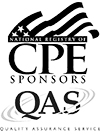Avoiding Ethical Lapses as a CFE

Overview
Online
Description
The complexity and difficulty of the anti-fraud profession requires and demands that fraud examiners operate and conduct themselves with the highest level of ethical conduct.
In practical terms, ethics involves making the right decision even when one’s actions are not under scrutiny. You must be able to make the correct choices in times of pressure, especially when there is no one to answer to but yourself.
This course is designed to educate you about common circumstances that lead to ethical lapses in judgment and help you gain insights into the potential consequences of your actions.
Key Takeaways:
- Sources for fraud examiners to seek guidance on ethical dilemmas
- Introductions to and definitions of legal and ethical conduct and conflict of interest
- Examples, types, variations and illustrations of the Code of Professional Ethics
- Identify various sources of ethical guidance for fraud examiners
- Tips for distinguishing common causes of ethical lapses by fraud examiners
- Demonstrations and examples of ethical issues confronted by CFEs
Prerequisites
None
You Will Learn How To:
Identify various sources of ethical guidance for fraud examiners
Relate the CFE Code of Ethics to professional situations
Identify common circumstances that lead to ethical lapses
Recognize the consequences of ethical lapses
Apply the portions of the CFE Code of Ethics that commonly are the subject of complaints against CFEs
Table of Contents
| Lesson 1 | Introduction |
|---|---|
| Lesson 2 | Sources of Ethical Guidance for CFEs |
| Lesson 3 | The CFE Code of Ethics and Standards of Conduct |
| Lesson 4 | Common Causes of Ethical Lapses by Fraud Examiners |
| Lesson 5 | Consequences of Ethical Lapses |
| Lesson 6 | Typology of Ethical Lapses |
| Lesson 7 | What Would You Do? |
| Lesson 8 | You Be the Judge |
CPE Information
| CPE Credit: | 2 |
|---|---|
| NASBA Information: | Regulatory Ethics |
| Advance Preparation: | None |
| Last Updated: | October 2023 |
| Delivery Method: | QAS Self-Study |
Policies
CPE Credit
Please note: To be eligible for CPE credit, you must complete the final exam within one year of purchase date. You may only claim CPE credit for a course once.
ACFE Online Self-Study Courses
Features:
- 24/7 access to courses through your Internet browser
- Save time and quickly earn CPE credits with instant access, grading and printable certificate
- The flexibility to start or stop a course and pick-up right where you left off
- No additional shipping fees
Learn More about accessing your online self-study course
Learn More about online self-study courses and their features
System Requirements:
- Internet access: High-speed connection recommended
- Speakers required for video sound
 The Association of Certified Fraud Examiners, Inc. is registered with the National Association of State Boards of Accountancy (NASBA) as a sponsor of continuing professional education on the National Registry of CPE Sponsors. State boards of accountancy have final authority on the acceptance of individual courses for CPE credit. Complaints regarding registered sponsors may be submitted to the National Registry of CPE Sponsors through its website: www.nasbaregistry.org/.
The Association of Certified Fraud Examiners, Inc. is registered with the National Association of State Boards of Accountancy (NASBA) as a sponsor of continuing professional education on the National Registry of CPE Sponsors. State boards of accountancy have final authority on the acceptance of individual courses for CPE credit. Complaints regarding registered sponsors may be submitted to the National Registry of CPE Sponsors through its website: www.nasbaregistry.org/.
Ordering and Returns
Satisfaction Guarantee
If you are not 100% satisfied with any ACFE product, you may return it to us, provided it is in excellent condition, for a full refund of the item minus the cost of shipping. Toolkits and bundles may only be returned as a complete set.
Ordering & Returns Policy

